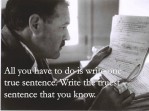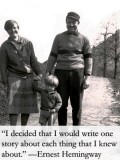It may seem as if this is take down Hemingway week here at Motive Means Opportunity, but really, it’s more about writers discovering the way that works best for them.
Hemingway was known for his saying “Write what you know about” although it’s usually  quoted as write what you know (which is actually attributed to Mark Twain). He also said
quoted as write what you know (which is actually attributed to Mark Twain). He also said
that a writer should start with one true sentence. Would that be one true sentence you know about?
These bits of advice might work well if you are Hemingway, and if you have lived his life, or the life of any adventurer. For the rank and file among us, we might not have much material if we limited ourselves to writing what we know. How can we know if something is true if we haven’t lived it? Where does imagination figure into the equation? Surely, research is not a twenty-first century innovation in fiction. We researched before the Internet made it an armchair occupation. Those of us of a certain age are well familiar with Mr. Dewey and his decimal system, and card files, and stacks, and microfiche, and the list goes on. Field research, primary source research, and nagging anyone you knew with certain knowledge or who could provide you with an introduction to someone who had knowledge. All of those options predate pixels on the screen. What was Hemingway talking about?
It’s true that most of Hemingway’s material came from his life. People he knew, experiences he had. He was the big game hunter, the mercenary, the warrior, the angler, the traveler, the two fisted drinker. He ran with the bulls (from the bulls????) in Spain, lived in Key West, and Cuba, in France, and Spain. So, how is the more moderate writer to apply his dictums? Just what did he mean? Was he deliberately trying to discourage writers by culling the competition? Nah. Although I can’t ask him, I’m pretty sure he meant something more metaphysical. And that he meant his two mottos to be used in conjunction.
This is the part where write what you know differs from write what you know about and the Twain confusion becomes a disservice to Hemingway. Write what you know implies firsthand experience. Write what you know about. That’s subtly different and opens the door to imagination. Writers “know” all sorts of things because the writer created them. Our worlds, our characters, and our plots can be products of imagination, and they live and breathe for us, and for our readers, if we do our job well. If we know all about the situations and the actors, we are writing what we know about. What is real for the writer becomes real for the reader. Movie directors have known this before the first talky. “Imagine your dog is dead.” They would tell child actors to bring real tears. The real tears would translate into audience empathy. The line between reality and imagination blurred. The end result, effective.
The writer’s intimate knowledge of the story and characters makes it true. Start with one true sentence. If the opening reveals visceral knowledge on the part of the writer, the sentence is true, even if it’s a product of imagination. The writer captures the reader. The reader enters into a new world and is a partner to the writer. Write what you know about, start with one true sentence.
Have you ever read a book so real that you Googled the story to find out if it was true? Was it?
Thank you, Ernest.

No. I never googled to find if a writer wrote what moved me. I write what moves me. Very little moves me, As for Hemingway papa was not wrong. He understood people and I like to read what I feel moves me. I want to be moved. I want my books to move. I don’t care if anyone dislikes what I write. I write. Simply
LikeLiked by 2 people
Very astute, MJ–and how could anyone disagree with your philosophy on writing? You write what you wish to write. It’s that simple. Wisdom in a few words.
LikeLiked by 1 person
I might have blasted Hemingway sometime during the last post by an Obscure Mystery Writer, but I still overall respect EH and the body of work he left. I also believe he and his contemporaries had an advantage over us, the modern American middle-class writers. We can scarce afford to settle down in Gay Paree to gather, drink, commune, and sometimes write in our favorite neighborhood cafe/bar. Imagine the electricity zapping around such a room, the budding greatness waiting to emerge from the confines of said establishment! All that counted big time, just as surely as a major league dugout where players are pulling for one another and the camaraderie builds until it’s like the Three Musketeers: “All for one, and one for all!”
Such driven creativity is rare in this day and age. Mostly, we authors labor alone in our individual small niches where we face the blank screen, knowing we will never reap–no matter how talented one might be–the financial and promotional rewards that Hemingway, Fitzgerald, Hammett, Chandler, or Macdonald could ever dream of reaching.
Yet, we labor on, more for the love of writing than any pie-in-the-sky rewards that might or might not be in the offing. We do it for the love of writing, or the need to write, or better yet, the DISEASE that clutches its gnarly fingers about our collective throat. We write because we must!
LikeLiked by 1 person
So true. While I don’t care for much of his work, and that is a matter of my particular taste, I do admire what it took him to produce it. He was a hard working writer and lucky enough to have plied his trade in a time when that was something special. It would be interesting if we could hear from him today.
LikeLiked by 1 person
Me, I don’t care if it did happen, I care if it could happen. I was giving a talk to a writing group last weekend, and somebody asked if I talked to real cops and detectives as research for my books. I said, “I would, if I were a completely different person.” Guess my point is, research is boring, as is the “truth.” No such thing as true. No such thing as false. Forgot what we were talking about. Refresh my memory?
LikeLiked by 2 people
Hmm, is this a Buddha blog I’ve stumbled onto? 😉
LikeLiked by 1 person
What can I say? I’m a deep thinker. . .hardly. Promise my next posting is mystery(ish) related.
LikeLiked by 2 people
LOL–I love research, but every writer has a different truth.
LikeLike